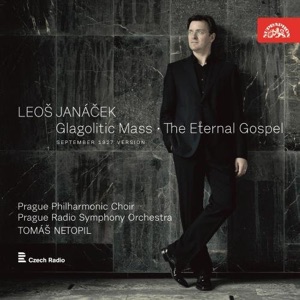Janácek “specialist” Tomás Netopil claims to be playing the “September 1927 version” of the Glagolitic Mass. Problem is, there’s no such thing, if by that we mean a fully finished edition. The work was premiered three months later, in December. That “original” score has been published, but it’s not exactly what Netopil plays here. For example, the organ part at the end of the Gloria is missing, and there’s no explanation for it. The Intrada appears only once, at the very end. The Introduction is different from both published versions, and much the worse for it. Other small changes in texture show that the work in its revised final form is much to be preferred.
Netopil’s premise in reverting to this version is based on a pretty obvious fallacy: that a composer’s first thoughts are invariably superior, and that the original form of a big, complex work represents his intentions so exactly as to require no revision. This is completely untrue, and it is even more untrue of a composer as quirky and improvisational in his methods as Janácek. I won’t bore you with the details, but the fact is that Janácek’s revisions after the Mass’s premiere were, in every case, improvements as regards structure, clarity of line, fullness of texture, pacing and impact. Netopil argues that the fact that others prettified Janácek’s scoring counts in favor of his original ideas, and so it does as often as not; but here we truly are dealing with his original ideas–only in this case as they appear in their final form. Since when is the ideal shape of an “idea” limited to its first iteration? Beethoven’s Fifth would sound very, very different if we played its famous opening in accordance with Beethoven’s initial sketch. This situation is fully comparable. It’s still all Janácek, and it is sheer hubris to suggest that his own revisions–based on actual experience of the work in performance–are somehow less legitimate than an earlier, unheard sketch. With friends like Netopil, Janácek certainly doesn’t need enemies.
Under these circumstances, the fact that the performance is a decent one, well played and well sung, hardly matters. Nor does the coupling, an enjoyable version of The Eternal Gospel. At least here there’s no excuse to deviate from Janácek’s one and only score. What’s Netopil going to do for his next stunt? I know! He should play the version of the Glagolitic Mass before Janácek decided to write it down. Now there’s authenticity for you.
































